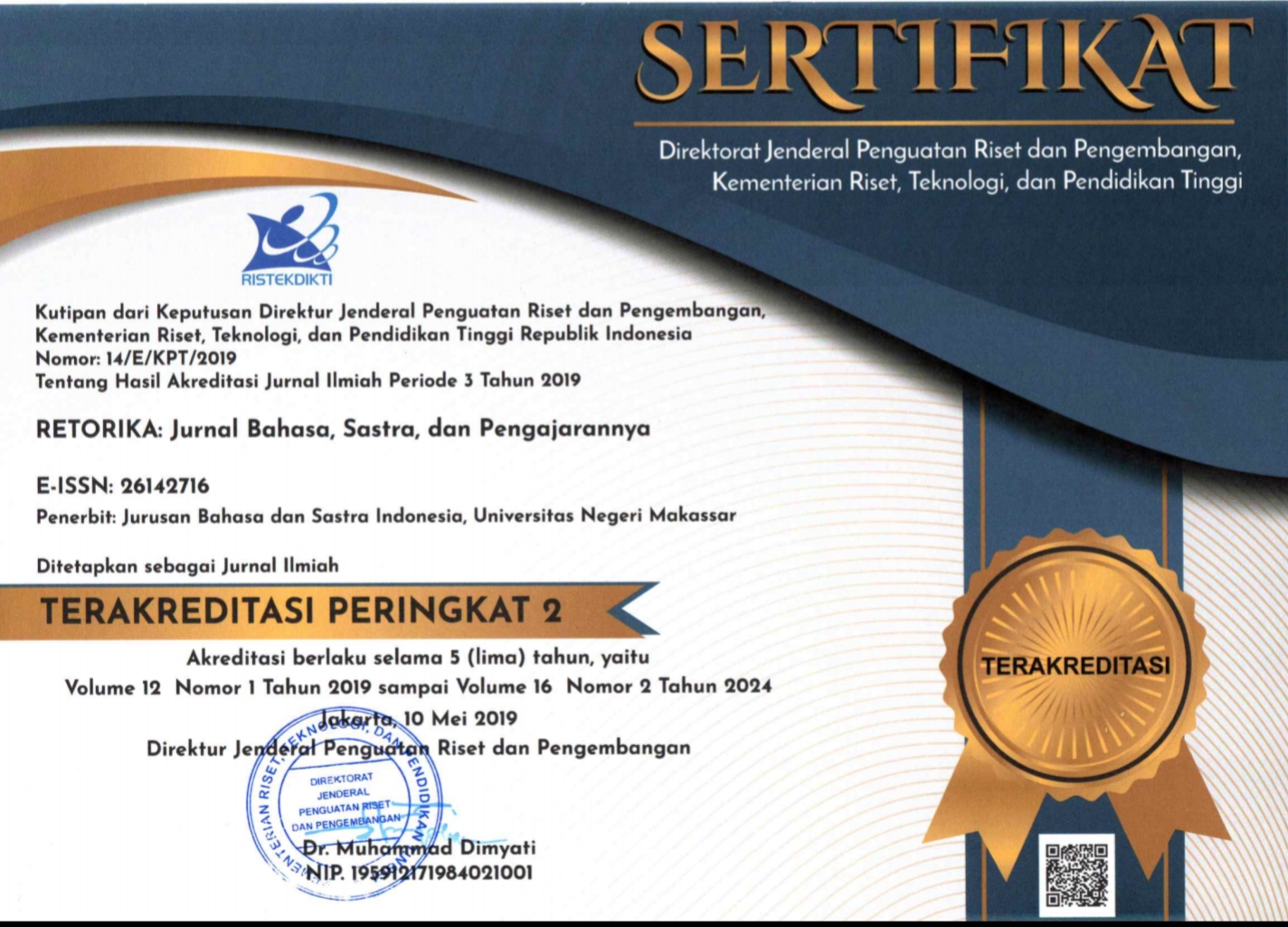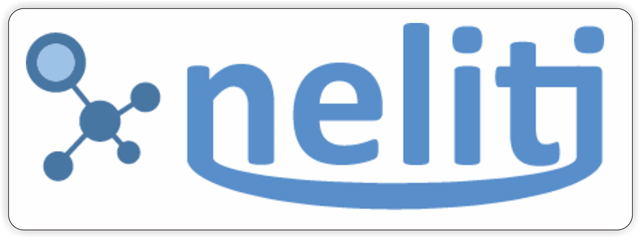THE ANALYSIS OF THE EDUCATORS’ ROLE TOWARDS THE ELEMENTARY SCHOOL STUDENTS’ LITERACY PROBLEM THROUGH THE HEUTAGOGY APPROACH
(1) Univeristas Negeri Makassar
(2) Universitas Negeri Makassar
(3) Universitas Negeri Makassar
(4) Universitas Negeri Makassar
(*) Corresponding Author
DOI: https://doi.org/10.26858/retorika.v15i2.47164
Abstract
Keywords
Full Text:
PDFReferences
Adriyanto, A. R., Santosa, I., Syarief, A., & Irfansyah. (2021). Design and multimedia learning principles of MOOC IndonesiaX. Jurnal Cakrawala Pendidikan, 40(1), 92-106. dx.doi.org/10.21831/cp.v40i1.34699
Alifia, U., Barasa, A. R., Bima, L., Pramana, R. P., Revina, S., & Tresnatri, F. A. (2020). Learning from home: A portrait of teaching and learning inequalities in times of the Covid-19 pandemic [Research Note No. 1]. Jakarta: The SMERU Research Institute. Retrieved from smeru.or.id/id/file/2840/download?token=B76KIt9G
Asian Development Bank. (2022). How to recover learning losses from covid-19 school closures in Asia and the Pacific [Briefs]. Retrieved from adb.org/publications/learning-losses-covid-19-school-closures
Asosiasi Penyelenggara Jasa Internet Indonesia. (2020). Laporan survei internet APJII 2019-2020 [Survey]. Retrieved from apjii.or.id/survei2019x/download/A5M8EelWdVa1BxtibqnYOcZ9ySuo47
————. (2022). Profil pengguna internet Indonesia 2022 [Survey Report]. Retrieved from apjii.or.id/survei2022x/download/MOs62lLcapHeFN730ZfqzCWkJwPAuX
Beatty, A., Berkhout, E., Bima, L., Coen, T., Pradhan, M., & Suryadarma, D. (2018). Indonesian Children: In School but not learning: A 2000-2014 analysis [Infographic]. Jakarta: RISE Indonesia Program. Retrieved from rise.smeru.or.id/sites/default/files/publication/[Infografis]%20Bersekolah%2C%20Apakah%20Belajar.pdf
————., Pradhan, M., Suryadarma, D., Tresnatri, F. A., & Dharmawan, G. F. (2020). Memulihkan penurunan kemampuan siswa saat sekolah di Indonesia dibuka kembali: Pedoman bagi pembuat kebijakan [Policy Notes]. Jakarta: RISE Indonesia Program. Retrieved from rise.smeru.or.id/sites/default/files/event/Florischa%20Ayu%20Tresnatri_Memulihkan%20Penurunan%20Kemampuan%20Siswa%20Saat%20Sekolah%20di%20Indonesia%20Dibuka%20Kembali.pdf
Bima, L. (2020). Preliminary analysis of the driving factors behind disparities in distance learning at the Elementary School level [Issue Notes No. 2]. Jakarta: The SMERU Research Institute. Retrieved from smeru.or.id/id/file/2839/download?token=MHyg-WwL
Blaschke, L. M. (2013). E-learning and self-determined learning skills. In Hase, S., & Kenyon, C. (Ed.), Self-determined learning: Heutagogy in action (hh. 55-65). London: Bloomsbury.
Creswell, J. W., & Gutterman, T. C. (2019). Educational research: Planning, conducting, and evaluating quantitative and qualitative qesearch (6th ed.). London: Pearson.
————. (2013). Qualitative inquiry & research design: Choosing among five approaches (3rd ed.). California: SAGE Publications.
Direktorat Jenderal Pendidikan Tinggi (2020). Booklet pembelajaran daring [Booklet]. Retrieved from dikti.kemdikbud.go.id/wp-content/uploads/2020/12/Booklet-Pembelajaran-Daring.pdf
Flick, U. (2018). Doing qualitative data collection - Charting the routes. In U. Flick (Ed.), The SAGE handbook of qualitative data collection (hh. 3-16). California: SAGE Publications.
Garnett, F., & O’Beirne, R. (2013). Putting heutagogy into learning. In Hase, S., & Kenyon, C. (Ed.), Self-determined learning: Heutagogy in action (hh. 131-143). London: Bloomsbury.
Garad, A., Al-Ansi, A. M., & Qamari, I. N., (2021). The role of e-learning infrastructure and cognitive competence in distance learning effectiveness during the Covid-19 pandemic. Jurnal Cakrawala Pendidikan, 40(1), 81-91. dx.doi.org/10.21831/cp.v40i1.33474
Gerring, J. (2017). Case Study Research: Principles and Practices (2nd ed.). Cambridge: Cambridge University Press.
Hase, S. & Kenyon, C. (2013). The nature of learning. In Hase, S., & Kenyon, C. (Ed.), Self-determined learning: Heutagogy in action (hh. 19-35). London: Bloomsbury.
Hastuti. (2020). Studi diagnostik pembelajaran pendidikan dasar di Kabupaten Bima, Provinsi Nusa Tenggara Barat [Field Report]. Jakarta: The SMERU Research Institute. Retrieved from smeru.or.id/id/file/2466/download?token=1WsbcdrV
Hewson, C. (2017). Research design and tools for online research. In N. G. Fielding, R. M. Lee, & G. Blank (Eds.). The SAGE handbook of online research methods (2nd ed., hh. 57-75). California: SAGE Reference.
Huang, A. (2020). Strategies to improve Indonesia’s teacher recruitment process [Catatan Kebijakan]. Jakarta: RISE Indonesia Program. Retrieved from rise.smeru.or.id/sites/default/files/publication/Policy%20Note%20-%20Strategi%20untuk%20memperbaiki%20perekrutan%20guru%20di%20indonesia.pdf
Hutagalung, B., & Purbani, W. (2021). The ability of digital literacy for elementary school teacher. Jurnal Pendidikan Indonesia, 10(4), 710-721. dx.doi.org/10.23887/jpi-undiksha.v10i4.32938
Indriani, S., & Suteja, H. (2023). Fostering reading interest through digital storytelling for young learners in the early childhood. EduLearn: Journal of Education and Learning, 17(2), 301-306. doi.org/10.11591/edulearn.v17i2.18372
Kartika, E., & Nuryasana, E. (2022). School literacy program in elementary school, Indonesia: Literature review. EduLearn: Journal of Education and Learning, 16(3), 336-341. doi.org/10.11591/edulearn.v16i3.20383
Kementerian Pendidikan dan Kebudayaan. (2020a). Survei belajar dari rumah terhadap siswa dan orang tua [Internal Documents]. Retrieved from gurudikdas.kemdikbud.go.id/news/Survei-Belajar-dari-Rumah-Terhadap-siswa-dan-orang-tua
————. (2020b). Survei belajar dari rumah Tahun Ajaran 2020/2021: Responden guru dan siswa [Survey Report]. Retrieved from repositori.kemdikbud.go.id/22367/
Kenyon, C. & Hase, S. (2013). Heutagogy fundamentals. In Hase, S., & Kenyon, C. (Ed.), Self-determined learning: Heutagogy in action (hh. 7-18). London: Bloomsbury.
Kurniawan, A., Usman, S., Utari, V. Y. D., & Hermansyah, D. (2020). Studi diagnostik pembelajaran pendidikan dasar di Kabupaten Lombok Tengah, Provinsi Nusa Tenggara Timur [Field Report]. Jakarta: The SMERU Research Institute. Retrieved from smeru.or.id/id/file/2737/download?token=WWI_PJo7
Marotzki, W., Holze, J. & Verständig, D. (2014). Analyzing virtual data. In U. Flick (Ed.), The SAGE handbook of qualitative data analysis (hh. 450-463). California: SAGE Publications.
Nopitasari, Adi, B. S., Riyanto, S., & Murti, B. C. (2023). Digital literacy: perceptions of primary school teacher education students. Jurnal Ilmiah Sekolah Dasar, 7(1), 27-34. doi.org/10.23887/jisd.v7i1.48400
Nurbani, R. I. (2020, Februari). Studi diagnostik pembelajaran pendidikan dasar di Kabupaten Lombok Utara, Provinsi Nusa Tenggara Barat [Field Report]. Jakarta: The SMERU Research Institute. Retrieved from smeru.or.id/id/file/2698/download?token=HNszfP0j
Nuryadi, M. H., & Widiatmaka, P. (2023). Strengthening civic literacy among students through digital literacy in society 5.0. EduLearn: Journal of Education and Learning, 17(2), 215-220. doi.org/10.11591/edulearn.v17i2.20746
Pritchett, L. (2022, 2 August). 5 Actions to move education systems to the next level. Presented at Workshop RISE Indonesia “Fighting the Learning Crisis, Building Foundational Skills”, Jakarta. Retrieved from rise.smeru.or.id/sites/default/files/event/RISE%20Workshop_Lant%20Pritchett.pdf
Raihani, & Sari, D. N. K. (2022). Policy implementation and sustainability: Qualitative study of the policies for literacy and multigrade approaches in Batu City and Probolinggo with the specific challenges of the Covid-19 pandemic [Research Report]. Jakarta: INOVASI.
Revina, S. (2022). Quality of teacher education delivery in Indonesia [Policy Notes]. Jakarta: RISE Indonesia Program. Retrieved from rise.smeru.or.id/sites/default/files/publication/Policy%20Brief%20A2%20PPG.pdf
Sanova, A., Bakar, A., Afrida, Kurniawan, D. A., & Aldila, F. (2022). Digital literacy on the use of e-module towards students’ self-directed learning on learning process and outcomes evaluation cources. Jurnal Pendidikan Indonesia, 11(1), 154-164. doi.org/10.23887/jpi-undiksha.v11i1.36509
Sari, D. I. P., Prayitno, H. J., Rahmawati, L. E., Minsih, & Pratiwi, Y. (2022). Culture of digital literacy in tgematic learning at the basic education level. Jurnal Ilmiah Sekolah Dasar, 6(3), 467-475. doi.org/10.23887/jisd.v6i3.46334
Sinaga, T. M. (2023, 31 March). Asesmen berkala untuk mengidentifikasi kemampuan literasi siswa. Kompas. Retrieved from kompas.id/baca/humaniora/2023/03/30/asesmen-berkala-identifikasi-literasi-siswa
Situmorang, R. (2022, 17 January). Menumbuhkan Gerakan literasi di sekolah [Blog]. Diakses dari badanbahasa.kemdikbud.go.id/artikel-detail/734/menumbuhkan-gerakan-literasi-di-sekolah
Sulistya, R. (2019). Heutagogi sebagai pendekatan pelatihan bagi guru di Era Revolusi Industri 4.0. Jurnal Pendidikan dan Kebudayaan, 4(2), 127-128. doi.org/10.24832/jpnk.v4i2.1222
Tay, B. H. (2013). Transitioning from pedagogy to heutagogy. In Hase, S., & Kenyon, C. (Ed.), Self-determined learning: Heutagogy in action (hh. 181-192). London: Bloomsbury.
Usman, S. (2021, 2 May). Belajar dari rumah yang tidak efektif selama pandemi berpotensi hapus bonus demografi [Blog]. Retrieved from rise.smeru.or.id/id/blog/belajar-dari-rumah-yang-tidak-efektif-selama-pandemi-berpotensi-hapus-bonus-demografi
Utari, V. Y. D., Kurniawan, A., & Hermansyah, D. (2020, January). Studi diagnostik pembelajaran pendidikan dasar di Kabupaten Dompu, Provinsi Nusa Tenggara Barat [Laporan Lapangan]. Jakarta: The SMERU Research Institute. Retrieved from smeru.or.id/id/file/2468/download?token=zKG4gPPl
————., & Kurniasih, H. (2021, 16 July). Pembelajaran jarak jauh masih akan tetap di sini: Kita harus buat kualitasnya setara sekolah tatap muka [Blog]. Retrieved from smeru.or.id/id/article-id/pembelajaran-jarak-jauh-masih-akan-tetap-di-sini-kita-harus-buat-kualitasnya-setara
Wuryanto, H., & Abduh, M. (2022, 5 December). Mengkaji kembali hasil PISA sebagai pendekatan inovasi pembelajaran untuk peningkatan kompetensi literasi dan numerasi [Blog]. Retrieved from gurudikdas.kemdikbud.go.id/news/mengkaji-kembali-hasil-pisa-sebagai-pendekatan-inovasi-pembelajaran--untuk-peningkatan-kompetensi-li
Article Metrics
Abstract view : 140 times | PDF view : 33 timesRefbacks
- There are currently no refbacks.
Copyright (c) 2023 Abdul Halik

This work is licensed under a Creative Commons Attribution-NonCommercial 4.0 International License.
Published by:
Department of Indonesian Language, Faculty of Languages and Literature, Universitas Negeri Makassar in cooperate with Asosiasi Dosen Bahasa dan Sastra Indonesia (ADOBSI) and Ikatan Program Studi Pendidikan Bahasa dan Sastra Indonesia (IKAPROBSI).
Address: Department of Indonesian Language Office, DG Building Second Floor, UNM Parangtambung, Daeng Tata Raya Street, Makassar, South Sulawesi, Indonesia
 Email: retorika@unm.ac.id
Email: retorika@unm.ac.id

RETORIKA: Jurnal Bahasa, Sastra,dan Pengajarannya is licensed under a Creative Commons Attribution-NonCommercial 4.0 International License.
















